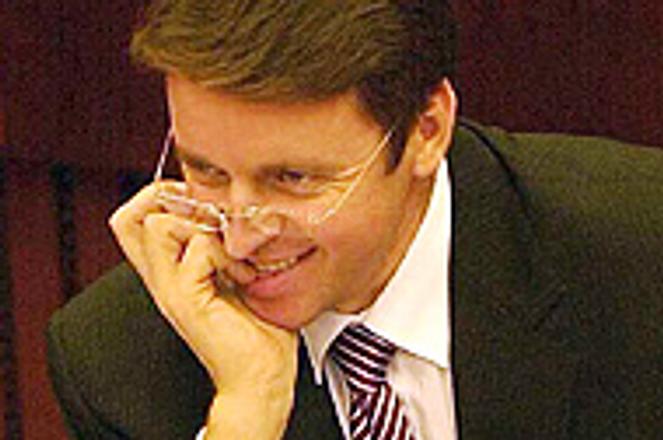MIKLOŠ has a reason to smile.photo: TASR
WHAT many feared a Herculean task for the ruling coalition turned out to be a straightforward adoption of the country's most important economic law.
On December 9, Mikuláš Dzurinda's minority government pushed the 2005 state budget through parliament without a hitch. The opposition immediately accused Dzurinda of buying the votes of independent deputies.
Finance Minister Ivan Mikloš did not allow the opposition's allegations to spoil his satisfaction with the outcome. The parliament handily approved the budget deficit at Sk61.52 billion (€1.56 billion) and the public finance deficit at 3.8 percent of gross domestic product (GDP).
"The budget is prepared in a way that supports the long-term aims of the current government," the Minister said.
Mikloš' concerns that numerous amendments would deform his original budget proposal appeared baseless.
"I am glad the budget was approved exactly the way we agreed on, and not a single unexpected amendment was proposed, " Mikloš told the press.
The opposition complained that even though some of its amendments were accepted, they constituted cosmetic touches.
Some 82 members of parliament voted in favour of the budget - four more than the number of ruling coalition deputies at the beginning of the election term.
The planned budget income in 2005 is Sk257.225 billion (€6.6 billion) with expenditures reaching Sk318.750 billion (€8.25 billion). The adopted law also includes preliminary budget proposals for 2006 and 2007, when the state deficit should sink to 3 percent of the GDP.
The Finance Ministry stressed that meeting its budget targets is crucial.
"If we fail to meet our targets, it will be impossible to solve Slovakia's sensitive problems, such as reducing unemployment, raising the standard of living, and improving our infrastructure," Finance Ministry advisor Peter Papanek told The Slovak Spectator.
The Healthcare, Education, Labour and Transportation Ministries will have the biggest bite of the budget apple - almost half the budget expenditures will go to these sectors.
The abolition of state subsidies for mortgages and the allocation of Sk1.4 billion (€350 million) for the creation of the Environment Fund were two of the most discussed features of the budget.
After lengthy talks among cabinet ministers, the ruling coalition reached a budget compromise October 4.
Although none of the ruling parties were entirely satisfied, all parties showed flexibility by lowering their original financial demands, which would have inflated the state budget by Sk10 billion (€240 million).
Prime Minister Mikuláš Dzurinda told the press that the quality of the budget proposal persuaded independent deputies to vote in favour of it. Smer leader Robert Fico claimed that the vote was tarnished.
"Business deals are at work here. What else can it be when opposition MPs shift their status to independent and vote for something they could not support under normal circumstances?" Fico told the news wire TASR.
The Finance Ministry says that continuing to reduce the public finance deficit and easing the state's debts will remain a top priority.
"Reasonable budget management is the basis of a sustainable economic policy.
In the same way that households must balance their budgets, the state cannot spend more than it earns over the long-term or continue to live on loans," Papanek said.
Nevertheless, the Finance Ministry forecasts a strong economy.
"The government expects a dynamic growth of the economy over the next three years, with inflation less than 3 percent and employment growth at 0.7 percent," Papanek said.



